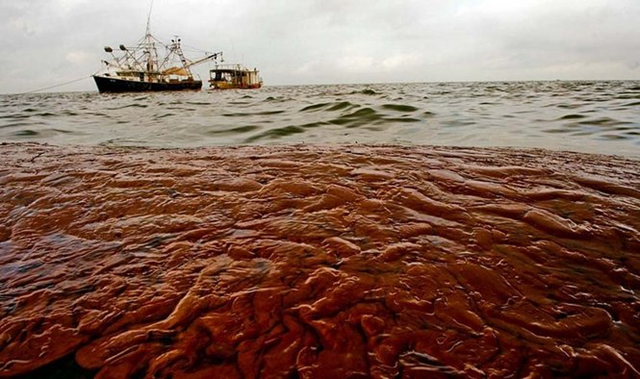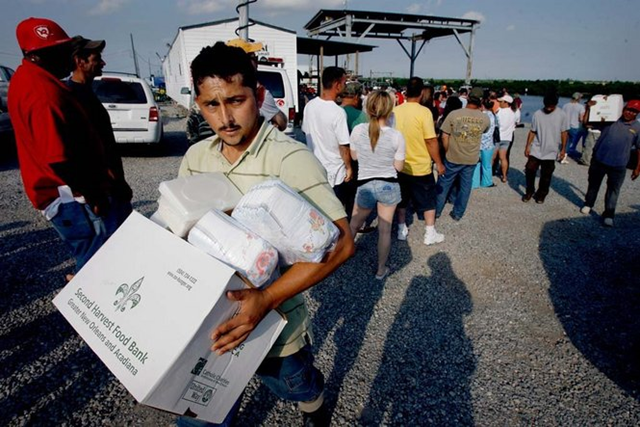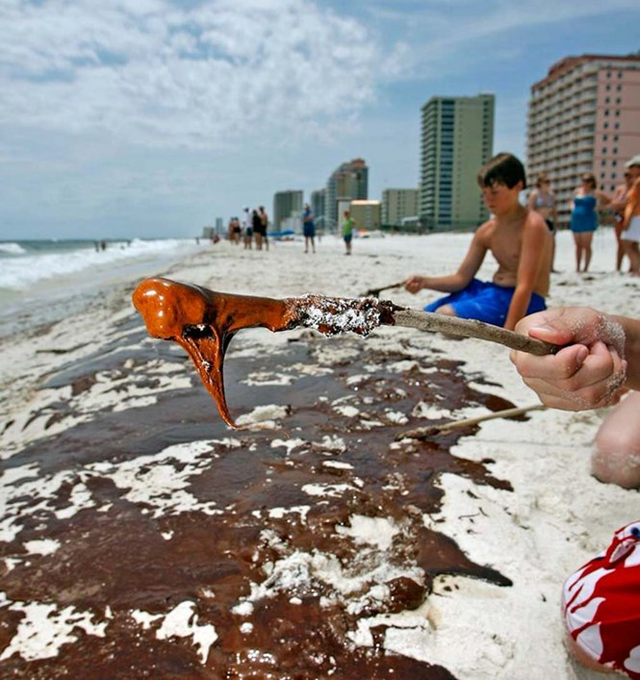Depression, anxiety, despair flow in wake of BP Gulf oil spill – Study finds widespread trauma
By Fran Lowry
March 1, 2011 The explosion of the Deepwater Horizon oil rig and subsequent spill, which gushed uncontrollably into the Gulf of Mexico for 3 months in 2010, has left those who live along the environmentally fragile Gulf Coast with increased rates of depression and anxiety and feelings of anger, hopelessness, and despair. The environmental disaster — one of America’s largest — may no longer be grabbing headlines in the rest of the United States, but to those living in the affected regions of Texas, Louisiana, Alabama, and Florida, it’s still very much front page news. Mental health professionals staffing crisis hotlines in the states affected by the spill report individuals in the region feel as though they’ve suffered a major setback. According to Scott Coffey, PhD, professor and director of the Division of Psychology in the Department of Psychiatry, University of Mississippi, Jackson, there is a clear upswing in stress. “The oil spill occurred in a population that was already struggling with the effects of Katrina. They were severely impacted. Add to that the negative economy that is stressing everyone, the national issues, the global issues, and these folks are getting hit hard.” Dr. Coffey recently submitted a grant to the National Institutes of Mental Health for funds to start programs to help foster resilience and coping skills. “The people on the coast are resilient, but most are maxed out on their ability to deal with stressors. So we are requesting help from the [National Institutes of Health] to help build resiliency in these communities. Because we know that another disaster is coming. We know there is going to be another hurricane. There is always that fear. And we know that there is going to be another oil spill.” … Allyson Pardue, who is in charge of training and clinical staff of the Baton Rouge Crisis Intervention Center in Louisiana, hears from people who have been directly affected by the oil spill and, she reports, they are not having an easy time. “Just about everyone who calls in for help is experiencing financial problems,” she told Medscape Medical News. “We are hearing a lot of anger and depression and anxiety-related problems because so many things are out of people’s control. For example, many people feel a lack of control over getting an adequate response on claims they have put in for aid because their livelihood has been affected.”Very little of the money that BP is said to have paid out to help people affected by the spill is actually reaching those who really need it. Or so it seems to the people whose claims have been denied. Baton Rouge, where many people were employed by the oil drilling companies, has been particularly hard hit. “People are working to hold BP accountable, I’m sure, but there is a lack of response or a denial on claims. People have never been through something like this before, and they don’t even know where to begin seeking help,” Ms Pardue said. Things sound great on paper, but, when people actually try to access that help, it’s virtually impossible, she added. “They make it such a maze that it gets to be an impossible task to follow through. We serve some people who maybe have filed a claim or they want to file a claim, but they’re being told they have to do additional paper work and it has to be filed online and they don’t have a computer. So they go to the library, where there’s only 1 computer. Or the librarian has to show them how to fill out the forms.” While they try to negotiate the mass of red tape to fill out claims forms to get money, they worry about paying the rent or the mortgage. …
Depression, Anxiety, Despair Flow in Wake of Gulf Oil Spill 
FRIDAY, Feb. 18 (HealthDay News) — The BP oil spill in the Gulf of Mexico last year had a major psychological impact on people living in coastal communities, even in areas where there was no direct oil exposure, new research reveals. Researchers from the University of Maryland Medical Center and the University of Florida, Gainesville, studied the psychological effects of the oil spill on residents in two fishing communities: Baldwin County, Ala., which had direct oil exposure; and Franklin County, Fla., where the oil did not reach the coastline but affected the community’s recreation, tourism and fishing industries. The investigators found similar levels of psychological distress in both communities. “People in both groups showed clinically significant levels of depression and anxiety,” Lynn Grattan, an associate professor of neurology at the University of Maryland, said in a university news release. “Also, where compared to people whose income was unaffected by the disaster, people with spill-related income loss in both groups had higher rates of depression, were less resilient and were more likely to cope using ‘behavioral disengagement,’ which involves just ‘giving up’ trying to deal with the problem.” A report on the findings was published online Feb. 17 in Environmental Health Perspectives. “From a public health standpoint, we need to understand that when there is a significant environmental crisis, we need to extend public health outreach and education, psychological monitoring and mental health services beyond the immediately affected areas, paying particular attention to people at risk for income loss,” Grattan said. “There are things that can be done to help people manage their stress and anxiety, and cope in these situations, so these interventions need to be available immediately in the communities where the impacted individuals live,” she added. More information The U.S. Centers for Disease Control and Prevention offers tips for coping with traumatic events.
Study Finds Widespread Trauma in Wake of BP Oil Spill 
By Bill Barrow, The Times-Picayune
February 28, 2011, 10:25 PM The first 1,000 invitations to participate in the federal government’s post-spill study on health effects were sent Monday to cleanup workers in four Gulf Coast states, federal authorities said. Dale Sandler, chief epidemiologist for the National Institutes of Health, said the next 1,000 invitations will follow “in a few weeks,” with the projected 10-year program ramping up to its goal of more than 100,000 invitees and 55,000 participants later this spring. The study, run by the National Institute of Environmental Health Sciences, targets individuals who worked in Louisiana, Mississippi, Alabama or Florida in the weeks after the Deepwater Horizon explosion last April. Researchers frame the effort as potentially ground-breaking, because it will involve tracking more individuals for a longer period than previous studies around the world. Sandler said the purpose of the study is to identify potential links between physical and mental health conditions and exposure to crude oil and chemical dispersant. The existing body of science, Sandler said, is riddled with questions. Indeed, the current circumstances feature on one side anecdotal evidence of sick workers and Gulf coast residents complaining of maladies that generally can be associated with organic compounds found in crude oil. Some scientists and physicians have weighed in with tests on samples of seafood, human blood and Gulf Coast soil that show elevated levels of some of the same toxins. Yet state governments, the FDA and the seafood industry all vouch for the safety of the seafood supply, and President Barack Obama’s National Oil Spill Commission acknowledged in its final report, released in January, only that health issues and the perception of inadequate government action are matters of concern. “Whether allegations that the spill created health problems for responders and Gulf Coast residents are warranted does not change the perception among some that government has not been responsive to health concerns,” the report says. The commission recommended that the Environmental Protection Agency establish a more thorough protocol to monitor health effects of major spills. Sandler did not question the findings of scientists like Wilma Subra, a New Iberia biochemist who has been highly critical of the government’s response on health issues. And Sandler said she has personally spoken with Gulf Coast residents who are symptomatic — particularly respiratory and skin ailments — and “trace their illnesses to the time of the oil spill.” …

This is the quintessential news story. Corporate trauma, Climate trauma. Hard times ahead..